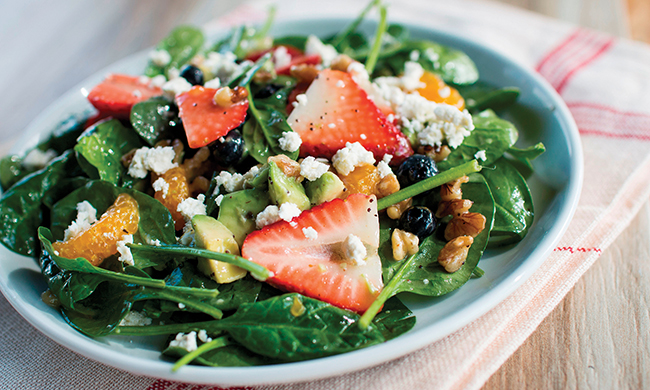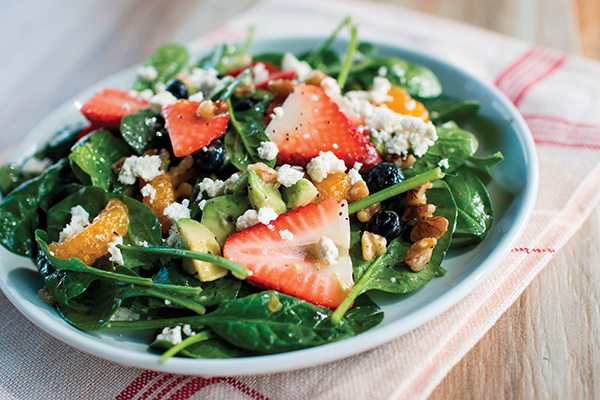
5 benefits of adding more produce to your diet
Maintaining a diet with an appropriate amount of fruits and vegetables has been linked to improved health, and for good reason. Fresh produce is loaded with vitamins, minerals, and antioxidants, plus a diet rich in fruits and veggies has been linked to reduced risks of heart attack, type 2 diabetes, stroke, certain cancers, and other chronic diseases.
Consider these benefits of adding more fresh produce to your diet from Rachael Derr, registered dietitian at Sweet Tomatoes and Souplantation, known for a 50-foot salad bar featuring more than 40 ingredients that give guests the freedom to create their own wholesome meals.
- Supports heart health and strength. Potassium, a powerful mineral most commonly associated with bananas, aids in healthy blood pressure, heart health and bone and muscle strength. It can also be found in sweet potatoes, white potatoes, soybeans, and leafy greens.
- Boosts lycopene levels. While some cooking processes can cause vegetables to lose certain nutrients, cooking others can actually improve their nutrient content. For example, when tomatoes are cooked it boosts their levels of the powerful antioxidant lycopene, which is linked with prostate health.
- Adds color. Generally, the darker the hue, the more nutrient-packed a vegetable is. Additionally, different colors indicate different nutrients in each food. Blues and purples contain antioxidants; greens contain vitamin K and folic acid; yellows and oranges contain higher levels of vitamin C, and reds contain lycopene.
- Increases oxygen flow. Iron is crucial for carrying oxygen from your lungs to the rest of your body. Pairing iron-containing foods, like lentils, beans, peas, and spinach, with foods that are rich in vitamin C, like bell peppers, broccoli, tomatoes and many fruits including citrus, can help your body absorb iron better. Vitamin C also promotes skin healing.
- Protects against infection. In addition to adding flavor to your plate, many vegetables also contain beneficial vitamins and minerals that can help in surprising ways. Vitamin A, found in carrots, sweet potatoes and dark leafy greens like spinach and kale, supports healthy eyesight and can also help protect against infections.

One creative way to get your fruits and veggies is with Derr’s Fresh Berry Salad, which pairs nutritious greens like spinach and romaine with refreshing strawberries and blueberries. Find more recipes and tips for adding produce to your diet at sweettomatoes.com or souplantation.com.
Fresh Berry Salad with Lemon Poppy Seed Dressing
Recipe courtesy of Rachael Derr, registered dietitian at Souplantation and Sweet Tomatoes
Lemon Poppy Seed Dressing:
- 3/4 cup apple cider vinegar
- 3/4 cup lemon juice
- 1/4 cup Dijon mustard
- 1/2 cup sugar
- 1 teaspoon kosher salt
- 1/2 teaspoon black pepper
- 1 tablespoon poppy seeds
- 1 2/3 cups canola oil
Fresh Berry Salad:
- 6 cups spinach
- 2 cups romaine lettuce
- 3/4 cup sliced fresh strawberries
- 1/3 cup fresh blueberries
- 1/3 cup feta cheese
- 1/3 cup walnuts
- 2 tablespoons scallions
- 1/3 cup canned mandarin oranges, drained
- 1/2 avocado, diced
- Lemon Poppy Seed Dressing
- To make Lemon Poppy Seed Dressing: In a blender, combine apple cider vinegar, lemon juice, Dijon mustard, sugar, salt, pepper and poppy seeds. Blend 1 minute, or until smooth and evenly incorporated. Slowly add in canola oil and continue to blend until oil is fully emulsified. Reserve dressing.
- To make Fresh Berry Salad: In a large bowl, combine spinach, romaine, strawberries, blueberries, feta cheese, walnuts, scallions, mandarin oranges, avocado, and Lemon Poppy Seed Dressing. Toss thoroughly to combine, making sure dressing has coated lettuce completely.
SOURCE:
Garden Fresh
Souplantation
Family Features
